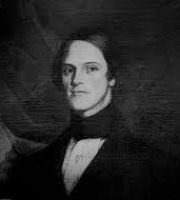About Alexander Beaufort Meek
Alexander Beaufort Meek (1814-1865) was an American poet, historian, orator, judge, attorney, public official, and journalist, and was the foremost literary figure in Alabama in the pre–Civil War period. Meek gained a reputation as an orator early on, delivering addresses at colleges and before learned societies. His first formal address was at an event celebrating the University of Alabama's alumni in 1836. Many of his addresses were published by the societies or schools for which he spoke, and many more were collected and published in his book Romantic Passages in Southwestern History (1857), so titled because the territories west of Georgia were known as the Southwest at the time.On July 4, 1838, Meek delivered an oration in poetic form titled "Day of Freedom," which was published by the Ciceronian Club of Tuscaloosa. Meek later included "Day of Freedom" in his poetry collection Songs and Poems of the South (1857). In 1839 Meek launched a literary monthly magazine, The Southron, which ran for only six issues owing to lack of subscriptions, sharing the fate of many literary publications of the time. In 1855, after his legislative term ended, Meek published his most ambitious work, a book-length narrative poem, The Red Eagle: A Poem of the South, set during the Creek War of 1813-14 and with the Creek chief William Weatherford (Red Eagle) as the hero. One of the earliest works of American literature with an Indian protagonist.
In 1857, Meek published two books: Romantic Passages in Southwestern History, a collection of orations and historical sketches delivered or published previously; and Songs and Poems of the South, a collection of prior compositions, bringing together the best of his poems and some pieces that had appeared in failed periodicals.
Meek died on November 1, 1865, at age 51. He is buried in Friendship Cemetery in Columbus, Mississippi.
Browse all poems and texts published on Alexander Beaufort Meek









